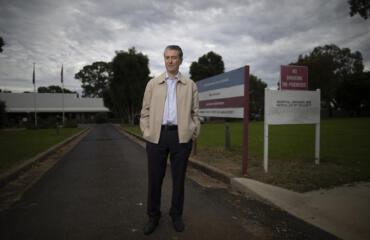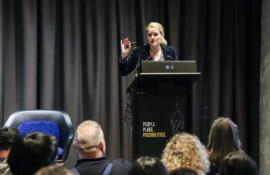
Somalis in Ivanhoe are being courted by political parties of every hue. Above: Labor’s Bill Shorten spruiks during last year’s federal election. PIC: SACOV
MELBOURNE Somalis are emerging as a key political bloc ahead of November’s state election, with the community drawing the interest of the major parties in the marginally-held electorate of Ivanhoe.
Concentrated around Heidelberg West, the group has grown into an estimated 3000-strong community since arriving in the 1990s from their strife-torn African nation.
While their political aspirations remain modest for now, with the refurbishment of a local sports ground their priority, commentators expect the group’s political voice to strengthen.
Ivanhoe is held by Labor’s Anthony Carbines, who won the seat in 2010 by just 1000 votes. Last year’s redistribution added slightly to that buffer, giving him a margin of 1.8 per cent.
The Mayor of Banyule, Craig Langdon, who also happens to be Mr Carbines’ predecessor as member for Ivanhoe, said the Somali community had been quietly making its presence felt.
“They’ve become such a focal point that candidates in state and federal elections drop in and see them,” he noted, adding that the strength of the community was often understated.

Mayor Langdon with community leaders
Officially, the Somalis number around 800 in the municipality of Banyule. But Cr Langdon claimed that number “must be larger”. “Not all of them would have filled out the census forms,” he added.
Hussein Haraco, a Somali-born businessman who owns shops in The Mall, the main retailing focus in Heidelberg West, agreed. “The figure is closer to 3000,” he estimated.
About 40 per cent of shops in The Mall are managed or owned by Somalis. Mr Carbines’ electoral office is also located in The Mall, which he said had allowed him “a good understanding of the needs and aspirations of this community”.
Dr Haraco is deeply involved in the Somali community. As president of the Somali Australian Council of Victoria (SACOV), and former president of the local traders’ association, he claims valuable insight into how the community has been faring in Melbourne.
“There was a very big gap in the Heidelberg West community years ago,” Dr Haraco said. “But these days that gap is closing because the Somalis and the non-Somalis know each other very well. We are part of the community.”
Nick Economou, a senior lecturer in Monash University’s School of Social Sciences, said new migrants tended to take a few years to acclimatise to the Australian political system before becoming actively engaged in the political process.
“The first signs of their inclusion into the political system is when they start to join branches of the major political party operating in the area, and when they start to impact on representation when it comes to local government elections,” he said.
In 2012, two members of the Somali community ran in local council elections. Neither picked up more than 10 per cent of the vote, but Cr Langdon — who benefitted from preferences — and Dr Haraco agreed that it had been a good learning experience.

Liberal candidate Carl Ziebell with community leader Jabir Mohamed Ali
Dr Economou said that “usually, migrants tend to be earning less and live in more economically vulnerable areas of the economy . . . so they tend to align themselves with Labor”.
Dr Haraco, despite being a Labor Party member, said he believed Labor took ethnic communities for granted. He said that nationally, the Liberal Party more often put forward ethnic candidates in areas with large ethnic communities. He suggested, however, that this tactic was cynical, and that members of ethnic communities would “see the person and not the policy”.
Cr Langdon, who is an independent, claimed strong support from the Somali community, adding that he would never take the community for granted. “You can’t take anybody for granted,” he said. “Community groups are no different.”

Ivanhoe MP Anthony Carbines (left) and Labor leader Daniel Andrews with Dr Haraco and Banyule’s Cr Rick Garotti
The City of Banyule has been lobbying for State Government funding for Ivanhoe’s Cartledge Reserve, where soccer is played. With a third of the required funds already promised by the city, both the council and Somali community are keen to see what the major parties can offer.
Mr Carbines said that while Labor had promised $500,000 for the redevelopment of the reserve in 2010, the commitment had evaporated with Labor’s election failure. Meanwhile, the Liberal candidate in last year’s federal election, Nick McGowan, had managed to secure $50,000 from his party’s campaign — an achievement noted by Cr Langdon and Dr Haraco as impressive given the political climate.
While the push for upgrading Cartledge Reserve was beginning to awaken the Somali community to local politics, most remained more engaged with the politics of Somalia, according to Dr Haraco. Many of Melbourne’s Somalis were born there, and still kept tabs on family and friends back home.
But with the local Somali community increasingly entrenched in Melbourne, members of the community were looking to engage in Australian politics.
“A lot of people come out here with the attitude that they will live here for a few years while things back home settle down, and then they will move back. Everyone who comes to Australia thinks they will go home. Where’s home? This is where people know me, this is home.” — community leader Hussein Haraco
Having children born in Australia made it less likely that families would return to Somalia, said Dr Haraco. “How long has it been since we have been living here? Too long to go back,” he added.
“A lot of people come out here with the attitude that they will live here for a few years while things back home settle down, and then they will move back. Everyone who comes to Australia thinks they will go home. Where’s home? This is where people know me, this is home.”
With the Somali community now finding its place, its political voice can be expected to intensify. For now, lessons are being learnt about just how the Australian political system works.
“In Africa [politicians] can do everything,” said Dr Haraco. “That’s the problem. Here, they can’t do everything. They talk on your behalf and try to help. That’s the first lesson.”
According to Dr Economou, the “newly arrived people pretty quickly conform with the dominant pattern in Australian politics – they tend to identify with one or the other of the major political parties”.
Dr Haraco said that the Somali community tended to vote as one. “[Somalis] vote in a group . . . they follow each other. It’s the way they have voted so far.”
But, he added, “there is no religious leader or person who tells them how to vote”.
Despite Labor being the dominant party in the area, the Somali community were savvy enough not to place all their eggs in the one basket, according to Dr Haraco.
“We are waiting for some commitments from both sides of politics. We are waiting to see if they will commit something, not only for the Somali community but for the whole area.”
The Liberal candidate for Ivanhoe, Carl Ziebell, said that he was fully supportive of the refurbishment of Cartledge Reserve and that “the Napthine Government is acutely aware of the role sport has in our local community”.
Labor’s Mr Carbines said that upgrading Cartledge Reserve was a worthy project, and Labor would be committing more to the electorate in the coming weeks.



